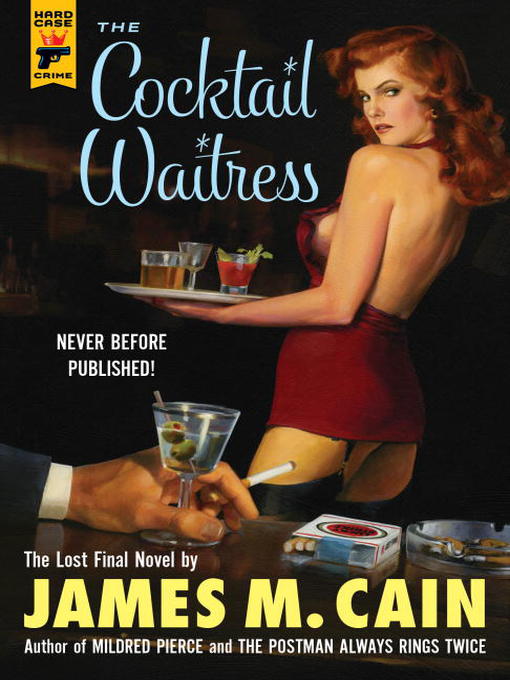
The Cocktail Waitress
کتاب های مرتبط
- اطلاعات
- نقد و بررسی
- دیدگاه کاربران
نقد و بررسی

July 9, 2012
Reviewed by Meghan Abbott. More than halfway through American noir master James M. Cain’s The Cocktail Waitress, just before its house-of-cards plot collapses under its own weight (then, in its final paragraphs, springs to life once more), the narrator tells us, “I began to realize how terrible a thing it was, the dream that you make come true.” Cain could have just as easily said those words himself. In fact, he did. “I write of the wish that comes true,” he once wrote, “for some reason a terrifying concept, at least to my imagination.” In his novels, you find neither the poetry of Raymond Chandler nor the lacerating intelligence of Dashiell Hammett, but Cain makes up for both in his keen understanding of the human heart, its darkest chambers. His best novels leave you feeling jolted and bruised. The Cocktail Waitress was Cain’s bête noire, a tale with which he wrestled during his final years. The white whale of noir scholars since the author’s death in 1977, this novel was recovered after a nine-year hunt by Hard Case Crime editor Charles Ardai, who assembled this published version from multiple versions, the same scenes rendered multiple times, none of them dated. The plot concerns a beautiful widow under suspicion by the police, a hustling young man, a sickly millionaire—all the elements of a classic Cain “love rack”—seamy tales of feverish and restless strivers caught in traps of their own making (The Postman Always Rings Twice; Double Indemnity). And like so many of his novels, it’s a confessional tale, told from the viewpoint of the widow herself, forced by economic necessity to wait tables and compelled by a mix of ambition, maternal longing, and pique to take a series of perilous risks to hit the big gold dream. What’s missing, however, is Cain’s trademark propulsive pace. The novel reads in fits and starts, perhaps the inevitable result of its bumpy lineage. Cain seems frequently bewildered by his female narrator, by how to articulate her physical desire, by how a woman might even think about her body—a potentially fatal flaw in a story about the dangerous places desire will take you. Likewise, the two male corners of the love triangle feel vague, inconsistent, and broad all at once, and the story repeatedly stutters to a halt before its final surge. Yet The Cocktail Waitress still offers much of the addictive weirdness of vintage Cain: delirious coincidences, the hidden kinks of the middle class, and a prime example of what has always been one of Cain’s greatest talents: the turn-of-the-screw moment when we realize just how trapped our narrator has become. The concluding pages offer one of the niftiest plot twists you ever saw coming—and because you are waiting for it, it hits you twice as hard. This is the essence of Cain. As with all his saps and patsies snared by their own greed and risk taking, we know the minute we meet them they are doomed. And they know it, too, but can’t stop themselves anyway. They don’t want to. (Sept.) Megan Abbott is the Edgar-winning author of six novels, including The End of Everything and her latest, Dare Me (Little, Brown/Reagan Arthur, July).

June 1, 2012
Cain began this novel in 1975 at age 83. Following his death two years later, the manuscript was stashed away and forgotten until it was brought to the attention of Hard Case Crime publisher Charles Ardai, who hunted it down. The book sports elements familiar to Cain's classic works, notably an older man with a young, hottie wife. The first-person narrative follows 21-year-old Joan Medford, whose drunken bastard husband crashes into a wall, leaving her and their toddler son destitute. Joan lands a job slinging booze in a local lounge where her beautiful face and centerfold goodies draw the attention of moneybags businessman Earl K. White, who woos and marries her. Joan's babelicious bod proves too much for Earl's angina, and after she plants hubby number two--this time leaving her filthy rich--the cops cry murder. VERDICT Though reminiscent of Cain's early work, this story offers a new twist regarding his seductive protagonist. Writing from the perspective of a 21-year-old woman isn't the most natural thing for an octogenarian gent, but Cain pulls it off adequately. Overall, the characters are fully fleshed out, the dialog flows, and Cain's signature sexual tension crackles on every page. A tasty cocktail, indeed.--Mike Rogers, Library Journal
Copyright 2012 Library Journal, LLC Used with permission.

September 1, 2012
The publication of this long-lost James M. Cain novel is a genuine literary event. One of the great trinity of classic American hard-boiled writersalong with Chandler and HammettCain will always be known for The Postman Always Rings Twice and Double Indemnity, but his later work often suffers from an overdose of melodrama and a certain slackness in plotting. Sadly, this effort, which he was working on when he died in 1977 and is now published for the first time, falls squarely into the less-interesting camp. It begins with a promising premise reminiscent of Cain's Mildred Pierce: a recently widowed woman is forced to take a job as cocktail waitress and quickly learns how to navigate life as a working woman. Just as quickly, though, two utterly unbelievable men enter her life: a handsome but nutty lothario with a plan to clean up the nettles in Chesapeake Bay with atomic waste, and an elderly rich guy with heart problems. The plot careens its clumsy way from there to a totally bizarre ending, but along the way, there are snatches of the crisp, disarming prose style that distinguished Cain at his best. Those moments will keep the author's fans going, even as they reach the melancholy conclusion that this literary event lacks much literary substance.(Reprinted with permission of Booklist, copyright 2012, American Library Association.)

























دیدگاه کاربران